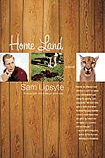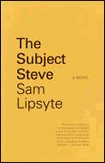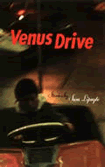Sam Lipsyte
posted Jun 2, 2005
We at failbetter.com are proud to count Sam Lipsyte among our alumni. Since we ran his story "Flashback, or Why Nobody Won the Fight Between Our Fathers in Walt Wilmer's Toolshed," in the spring of 2001, he's made a name for himself as both a short story writer and a novelist. We caught up with Sam recently to ask him a few questions about Home Land, his latest novel, which has cemented his reputation as one of the most daring, entertaining writers around.
| * * |
Like a number of your protagonists—the morphine-shooter of "Cremains," to cite one—Home Land's Lewis Miner struggles, at every turn, to live outside the mainstream. He resists taking steady work, managing his money in any sensible way, settling down romantically, even driving. Is this an adolescent reflex on his part, a hipster effort to "be different"? Or is he playing for bigger stakes, using his life to make a point about the pointlessness of our achievement-focused culture?
Well, it's interesting you put it that way. I don't see him struggling to live outside the mainstream. Perhaps he's made some choices that make him unfit for it, but the struggle is really just to get by. He's certainly in possession of some adolescent characteristics, but I don't see it as part of any "hipster effort." He's just a little stunted. I can't imagine him using his life to make a point, but I think along the course of the book he comes to some understanding about the ways one can avoid being undone by the level of distortion in our culture. The discovery does take a while. He also doesn't exist, which makes it even harder.
Home Land's main characters evince a deep cynicism about the value of all forms of psychological therapy. Yet they still use the language of therapy culture to talk about themselves, their problems, and their relationships. What gives here? Has therapy culture so pervaded our thinking that no one can get beyond its categories? Or do Lewis, Gary, and even Hollis maintain a lingering faith in therapy's ability to help us understand and improve ourselves?
We all have relations to this kind of talk, whether conscious or unconscious. Those particular characters use it with varying degrees of distance, and suffer the self-loathing that such distance engenders. Hollis is a psychopath and probably has no feelings so he's mouthing what he hears to pass as human. Gary has been destroyed by the psychiatric industry but he may suffer from a sort of Stockholm syndrome. Lewis Miner's stance is probably the most purely cynical, but it also stems from the least amount of experience. And as vulgar and awful and reductive as therapy culture is, at least it's not as bad as your average monotheistic death cult.
Home Land is nominally a novel, but it seems more like an extended character study, each episode a set piece, in which you examine another aspect of Lewis's personality. Did you aim to write a traditional novel, in which the plot's development is intertwined with the protagonist's personal evolution? Or did you mean from the outset to write a sort of anatomy of loserhood?
I'm not exactly sure what your definition of a novel is here. My aim was to launch a narrative fraught with emotional and physical conflict in a voice fashioned for such an undertaking. But I can't really plan ahead. I'm not really sure what I'm doing until I'm done, or at least well into the thing.
At one point, Lewis says that people can be happy in an unhappy way, and satisfied to be unsatisfied. What does he mean?
Precisely what he says.
Home Land is filled with scenes in which people do way-over-the-line things to one another, the most notable examples being Lewis's twin "teabaggings," at the, err… hands of Philly, the class bully, and Principal Fontana's and Hollis's, err… encounter, at the class reunion. Curiously, these scenes are among the funniest in a very funny book. Did you make them as shocking as possible in order to make them as funny as possible? Or did you mean to make a broader point about your characters, their relationships, and their world?
I'm definitely not interested in simply being shocking, not for any moral reason but because it's a dead end. You'll never be able to shock enough. There are moments of sexual humiliation and moments of terrible violence in this book, but they arise from forces set into motion by the narrative. If these events are disturbing there is also logic built into them, I hope. Like Oedipus taking out his eyes. Or Teabag getting teabagged again.
For an aggressively anti-sentimental work, Home Land contains a few quite sentimental episodes—notably the one in which Mikey Saladin, Eastern Valley High's most successful graduate, makes a point of hanging out with ur-loser Lewis in front of their classmates. Did you feel compelled to include these scenes, to make the narrative less bleak than it would otherwise be?
Well, if I remember correctly, that's a pretty painful scene. Saladin starts to grandstand and subsequently makes Lewis feel even worse about himself. That said, I never feel compelled to make the narrative more or less bleak.
Rumor has it, you recently sold the movie rights to Home Land. What actors could you see in the role of Lewis Miner?
I don't know. Jonathan Lipnicki?
As a film character, how will Lewis be different from such semi-lovable, self-loathing antiheroes as Ghost World's Seymour, American Splendor's Harvey Pekar, and Sideways's Miles Raymond?
That's up to the screenwriter, the director and the actor, I think. The book is the book. I have no idea what a movie would be like.
Has Home Land's success enabled you to spend more time writing, or have the demands of interviews and the like kept you from writing as much as usual?
The success of Home Land was that it was published at all. It took a long time and had to come out in the UK first. The demands of interviews are nothing compared to the demands of rent and utilities. I've been doing other things to pay the bills, mostly teaching, and I have baby son, so I haven't been able to write much these days.
You've had equal success writing short stories and writing novels. Which do you prefer, and why?
I love both forms. I don't really have a preference. My last two books have been novels, but my first was a collection. I began with stories because they were easier to ditch when they went awry, and that's important when you're starting out. Sometimes you begin writing and after ten, fifteen, twenty pages you have a feeling about it. You sense whether you've caught a big wave that will keep going or something smaller. You ask yourself: Should I make another big turn or prepare for an elegant exit? Are things widening or narrowing? In the same way something will tell you its nature, if you listen, it will also hint at its duration. Sometimes it's a story and sometimes it's a novel.
What's your next project—another novel, or more stories? What can you tell us about it?
I'm really not anywhere concrete right now. I've written a few new stories in the last year. I may continue the trend, or something larger might come along. I'm happy either way, as long as the sentences are daring me to proceed.
© 2005 failbetter LLC · all rights reserved










